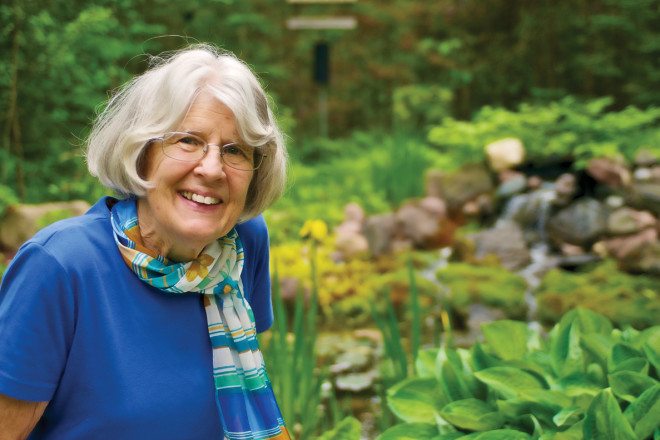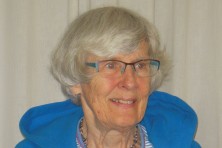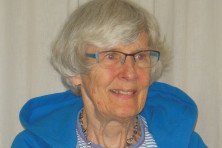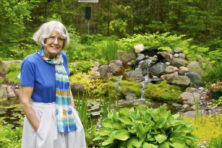Hanne Gault: Stranger in Both Worlds
- Share
- Tweet
- Pin
- Share

“If I had it to do over again,” Hanne Gault said, “with the wisdom that age begets I wouldn’t have made the move.”
In 1955, at age 17, Gault accepted the invitation from an aunt to travel from Denmark to work for one year as a maid in a wealthy home in Massachusetts. “I was eager, very young,” she said, “eager to go places!”
Ten days on a luxury ship crossing the ocean was “a heady experience” for her but she found New York big and scary. Her aunt cautioned her to hang on to her purse and not talk to anyone.
“I spoke little English,” Gault recalled, “and was very unhappy.” When she received a call from an uncle who captained a freighter between Canada and Denmark, “I cried to have him pick me up. I wanted to go home.” But after talking with a cousin who had made a good life here, “she made me feel better.”
As a maid, “I had people tell me what to do, how to behave, to wear a uniform,” she recalled. “I had to say, ‘Dinner is served, Madam.’ I was a natural rebel and didn’t like that much.”
After that year Gault returned to Denmark for nurses’ training, graduated in 1960 and came back to the United States for work and travel. She became a nurse at the Cornell Medical Center in New York City; during her first week she attended a dance for interns, residents and nurses, meeting Sidney Gault who had a fellowship at the Memorial Sloan-Kettering Cancer Center across the street. “He asked me to dance,” she said, “walked me home, and four months later we married.”
The Gaults had three children (Karin, Adam, and Eric) and made their home in Lake Forest, Illinois. Sidney worked as a dentist; because of her family Hanne returned to school and became a junior high math and science teacher, an occupation with regular hours. She enjoyed teaching as much as nursing, she said, because she loved the kids.
“My husband helped me a great deal with science, and I loved math; it was so defined,” she said. “But my nature inclines toward music and literature.”
She has written poetry since she was a child when she helped an uncle compose verse for family occasions. When her children were older she began writing more seriously; after retirement she attended poetry workshops and joined the Wallace Group of writers.
Gault carries with her a notebook for making observations on life around her and her life in Denmark. “You mine your past” as a writer, she said. Oftentimes she writes late at night. “It’s a need to express yourself.
“I like ‘twisted thinking’ sometimes,” she added. “Pretty is not a word for my kind of writing. I have a hard time writing nature poems.”
Gault feels ambivalent when she reflects on her life in the United States. “At this point I am a stranger in both worlds, not at home in either, yet at home in both. Where you come from defines you, but your home and children tie you here.
“Family becomes more important as you grow old,” she continued, “and I cannot leave my family here, yet I constantly long for my previous life, the culture, the language, the ability to know that one has a common ethos with those around.
“The immigrant experience carries with it an emotional stress that has no remedy, one that for me has become more pronounced with time.”
The Gaults have a son living in Taiwan, “so far away,” she said. “I understand how my parents felt.” While her mother didn’t deny her the opportunity to go to the United States, “she was very unhappy that I left.”
Gault admires the society of Denmark as in many respects it is ahead of this country socially and made her “feel more like a human being.” However she finds herself better connected in Door County than elsewhere in the United States. “You feel that you belong; you recognize people and are known.” She and her family have vacationed in Door County since 1963; Wills Cottages in Ellison Bay is one of their favorite spots. After their retirement in 1997 the couple made their home here.
Gault never writes in Danish. “I would rather express myself in my original language,” she said, “but English is a rich language with so many ways to say something.”
Gault’s poetry has appeared in a number of publications, including the Wisconsin Poets’ Calendar. “I have been working for years on a chapbook,” she said, smiling. “But I don’t know that the world needs another chapbook!”
Looking for America
I remember the day President Roosevelt died.
We heard it on the radio and even though
it happened on the other side of the world
It made an impression on me.
My mother was ironing my father’s shirt.
At the news she set down her iron
and put her hands to her face in sorrow
over the loss of the savior of our wretched world.
FDR, the embodiment of America,
the measure of our prayers and hope of the world.
a cause for jubilation across Europe
with the arrival of the Yanks.
As an immigrant to America
I came with the belief like Roosevelt
that the US government was a force for good
and a true instrument of the people.
Now people say government is our enemy
On television and talk radio politicians
trash each other undermining
the public confidence.
Let’s return power to the people they say
Let’s get government off our backs.
A recent Hollywood actor turned President
said Government is the problem.
But I’m thinking that it wasn’t long ago
there was a government and a president who
brought America through the The Great Depression,
a world war and still preserved America’s democracy?
Wasn’t it the government
that affirmed the bill of rights,
preserved our natural resources,
civilized industry,
worked against bigotry,
served the right of workers,
protected the powerless,
and made it easier to be old?
Maybe the America we are looking for
lies buried like a fossil in amber leaving
us to our present sorry state.
The future is not what it used to be.
I’ll keep looking.
Immigrant
In the beginning
constant reminders
of loss of the familiar.
Always judging through
comparative lenses
to see what is lacking.
Say your name
as it should be said or the way
Americans make it sound?
After a few years
You redefine your values.
your history your sense of place.
Gradually America
becomes more important
than the home country.
It can’t be put to words.
It stays buried in the inner life
an emotional amputation.
Home is still clearly present
but now more an ideal memory
fused with longing.
Fifty years an immigrant yet part
of a culture that won’t let go.
Not enough years left to grow a new self.
America
I was seventeen when I first came
eager for a view of the land of plenty
close to glamour and boys driving big cars
just like they did in the movies I had seen.
Tante Ellen met me at the pier. I traipsed
behind her with my big suitcase in my new
high-heeled shoes, feeling forlorn and strange
not sure I had made the right decision.
America looked huge, indifferent ,
lots of traffic, lots of people, black people,
new to me, stark skyscrapers. Tante warned,
hang on to your purse. I was scared.
Faces talked at me, I understood nothing.
Everything went too fast. How would I ever
learn to feel at home in a place like this?
Already I missed my mother.
1984
Returning home after my mother’s death
You can’t go home again?
But there is always Mrs. Mikkelsen saying
good morning, Mrs. Hansen to my mother
and me when we pass her on the street
as she has been doing every morning
for the past fifty years.
And there is Mrs. Olsen on third with
her impressive bosom flowing over
the windowsill and always the safety pin
that keeps the front of her ripped
schmatte from coming entirely apart.
She is calling to Viggo, her husband,
the cigar maker, to forget about
coming home till he is sober, as he
tries to climb his contrary bike to the
squealing delight of the neighborhood kids.
On second is Mrs. Rasmussen who runs
a foot clinic in her living room and smokes
big cigars. Her son crashed his motor cycle
when he was only twenty-nine. He died.
People say she is out of her mind.
Mrs. Nielsen on first is pregnant.
Her husband is taking her
to the midwife on a push cart
because she is too fat to walk
and there are no trolleys or cars.
Mrs. Marx on the mezzanine
is German and a Nazi sympathizer.
She hisses every time she sees us
and lets Heinzi her son, who is fifteen,
wave the swastika from the window.
He sings all the Nazi songs he knows
for the soldiers who come every night
to shout and sing and stomp their feet.
I listen and worry that they may come
up to our floor and take us all away.
His sister Annie is my friend but
my father no longer lets me play
with her and ignores my tearful pleas.
I sometimes see her peek from behind
the curtain at our games in the street.
Mr. Levy the tailor on the corner
always stands in the doorway
with his daughter and greets us
on our way to school until last week
when his whole family disappeared.
Sometimes the street singers
come into our courtyard and people
throw coins wrapped in paper
to them from the windows with
requests for their favorite tune.
We hang upside down on the clotheslines
and perform daring stunts around
wet sheets, underwear and towels
and run like hell, tipping bikes that fall
at the super’s feet when he chases us.
The street and our small apartment,
(Four rooms and a loo) is my world
on the top floor of a square building
till I leave for America. A world, I reenter
after my mother’s sudden death.
The books she was sending for my birthday
hang in a bag on the kitchen door
neatly wrapped and ready to mail,
her crossword puzzle unfinished,
her coffee cup on the table by the chair.
I take the nameplate off the door and wait
for the movers to walk down the stairs
ahead of me so I can hide my weepy face,
homeless for the first time despite my age
but that was twenty five years ago.
They say you can’t go home again
but there is always Mrs. Mikkelsen
saying good morning, Mrs. Hansen
to my mother and me every morning,
as we pass her on the street.
You are from where?
I am from the land of low expectations,
self-deprecating humor and a pessimistic
outlook on life, where the happiness scale
is set so low that its people are counted
the happiest in the world.
I am from strong muscles and hard labor,
hair brushed aside with backs of sweaty hands.
I am from grey buildings and rain
and schools doing their best to crush
creative notions in their inmates’ brains.
I am from cool springs and mild winters,
short summer nights and long days
with sunrise and birdsong at 2 am.
I am from blond hair and blue eyes
and bare breasts on sandy beaches.
I am from the land of Carl Nielsen,
the Little Mermaid and Kierkegaard.
I am from laughter and “hygge”
that coziest of terms used by Danes
for togetherness at any chance.
I am from decency and honest intentions,
a nobody from nowhere in particular
where beech trees fill the forests
and the wind has made the country flat.
My bones ache for its shores.
“I like ‘twisted thinking’ sometimes. Pretty is not a word for my kind of writing. I have a hard time writing nature poems.”
~ Hanne Gault



